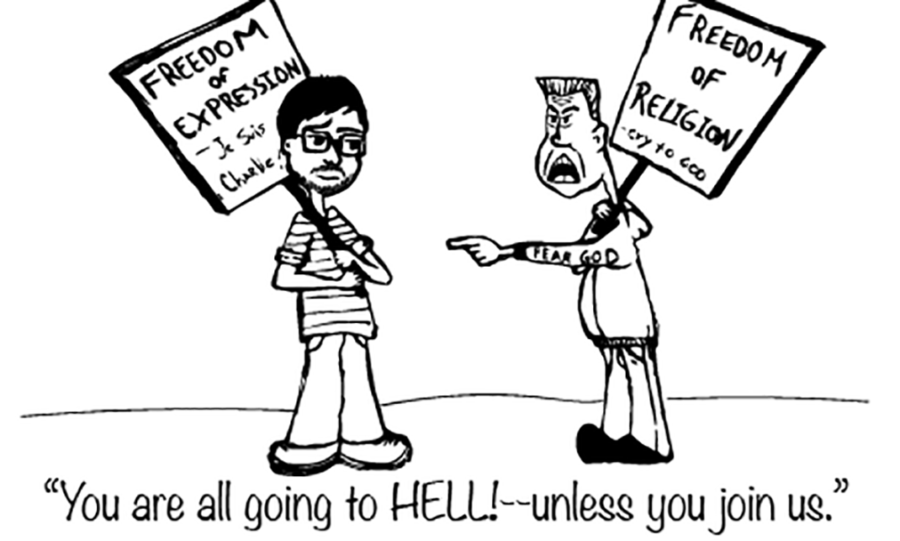Santa Rosa Junior College students responded to evangelical Christian radicals Jan. 15 with a small counter-protest, echoing an international debate about the interaction between free speech and religious extremism.
Evangelical Christian radicals from the group ‘Cry to God’ arrived on the SRJC campus around noon that Thursday and began provoking students, getting in their faces and yelling that all female non-virgins deserve to be raped, and that we are all going to hell.
In response, SRJC students argued with the radicals and organized chants. Many students felt that this type of speech should not be permitted on a college campus.
If SRJC were a private university it could enforce a code prohibiting certain discriminatory harassment, like Emory University did in 2007. Despite the radicals’ abhorrent sentiment, SRJC is a public campus, and because the evangelists did not disturb any classrooms, their freedom of speech is protected under the Constitution—just like free speech protects the student counter-protests.
Advocating that certain groups should not be allowed on campus is hypocritical. Just like the French were hypocritical for arresting comedian Dieudonné after he made a Facebook post supporting terrorism, two days after millions marched in the name of free speech.
Censorship, as history has shown, does not solve the problem. Furthermore, yelling back at them is only giving them what they want. Students and college administrators should never try to keep people from preaching because they could end up funding their cause. A Christian student at Thomas Nelson Community College in Hampton, Virginia, won $25,000 from the Virginia Community College system after campus police forced him to stop his offensive preaching on campus.
Groups like the Westborough Baptist Church seek lawsuits then use the money from these lawsuits to perpetuate and expand their cause.
Even though we have the freedom to yell back, it would have been more impactful to remain silent.
In Charlie Hebdo’s case, silence was not an option. If the cartoonists didn’t caricature the prophet Muhammad they would have been holding a double standard, treating Muslims with extra sensitivity than other religions that they routinely ridicule. Publications like Charlie Hebdo have an important role in society, forcing us to not take our religion or ourselves too seriously. Yes, their methods could be offensive, but they also had a clear, benevolent message.
Additionally, the Charlie Hebdo massacre cannot be viewed as an isolated incident of retaliation, as the counter-protest at SRJC can. No one deserves to die for something they said or drew. Ever.
Members of the same terrorist cell committed the Jewish grocery store murders days after the Charlie Hebdo killings and, as the story unfolds, the murders seem less about avenging a blasphemed prophet and more about a greater, more complicated issue of Islamic extremism existing throughout the world.
The Oak Leaf would never caricature any religious figure, but we accept that some publications push the boundaries of free speech. As a society we accept it, just like we did last Thursday when students met angry words with angry words. We had the chance to be violent and reactionary, like the terrorists, but we didn’t.
The Oak Leaf supports free speech, in all forms, offensive or not. Though, in the face provocateurs like the Cry to God evangelists, silence is the best response.


